The Retail Radeon HD 7870 Review: HIS 7870 IceQ Turbo & PowerColor PCS+ HD7870
by Ryan Smith on March 19, 2012 9:00 AM EST- Posted in
- GPUs
- AMD
- PowerColor
- Radeon HD 7000
- HIS
Overclocking: Power, Temp, & Noise
Of course no review of the Radeon HD 7000 series would be complete without a look at overclocking. In all of our testing AMD’s Southern Islands GPUs have proven to be impressive overclockers, including the reference 7870. In our 7870 review we hit 1150MHz on the core and 5.4GHz for the RAM, which made for a rather hefty overclock.
Our retail cards in turn one up the reference 7870. For core overclocking we hit 1200MHz on both cards, which is a 100MHz (9%) overclock over their factory overclocks, for a total of a rather incredible 200MHz (20%) overclock compared to a 7870’s stock clock. Given the overclockability we’ve seen for the Pitcairn GPU it’s unlikely that HIS, PowerColor, and other partners are having to do too much work for their factory overclocked cards, but we believe there’s at least some simple binning going on here, which would explain the better overclocks we’re seeing on these retail cards.
Interestingly this is all without overvolting of any kind. There still aren’t any tools capable of voltage control on the AMD reference PCB, so the limit is what you can get at reference voltages. If Pitcairn responds well to overvolting though, things could get very interesting in the future.
Memory overclocking wasn’t quite as eventful however, largely due to the fact that all of our 7870s use the same PCB and the same memory chips. Beyond 5.4GHz performance starts to plateau due to error correction. This is still a 500MHz (10%) memory overclock for the PCS+ HD7870 and a 600MHz (12%) memory overclock over the IceQ Turbo 7870 and stock 7870, but at this point GPU overclocking is eclipsing memory overclocking.
So what does a core clock of 1200MHz and a memory clock of 5.4GHz get you? In short, a lot of performance. But first, a look at power, temp, and noise.
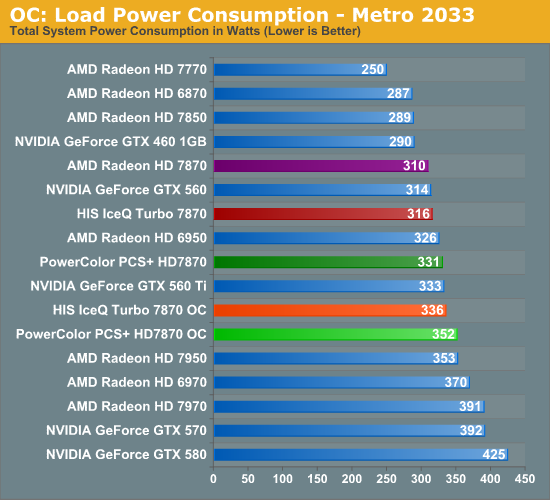
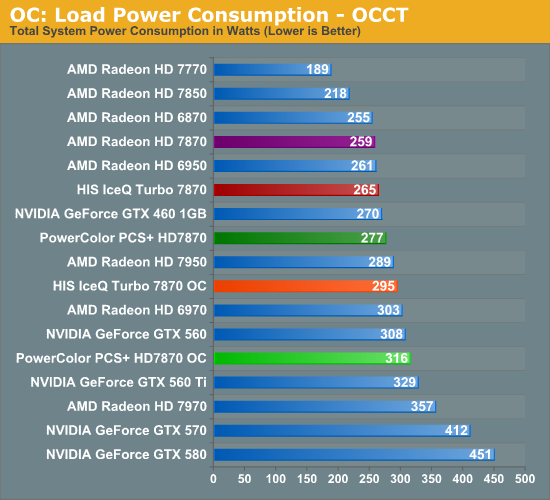
The power costs of this overclock are rather consistent for both cards. Under Metro these overclocks drive up power consumption by about 20W at the wall. Meanwhile under OCCT with PowerTune set at +20% (228W), power consumption jumps up by roughly 30W, which is more in line with the shift in PowerTune limits to prevent throttling than it is from the overclock itself. All things considered these aren’t massive increases in power consumption, but on top of the factory overclock it adds up. The PCS+ HD7870 in particular is 42W over the reference 7870 in Metro, which goes to show that while overclocking without a voltage increase doesn’t drive up power consumption as quickly, it can certainly have an impact.
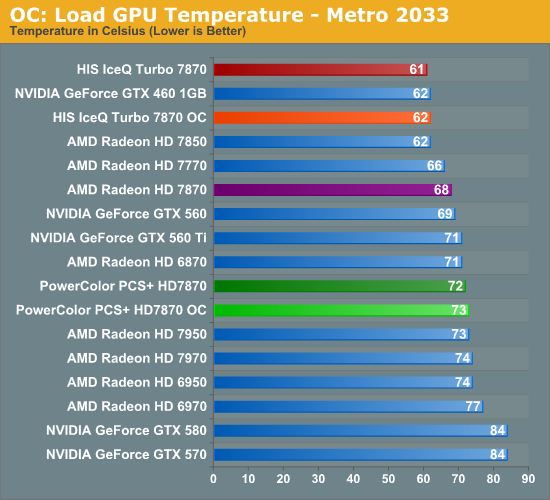
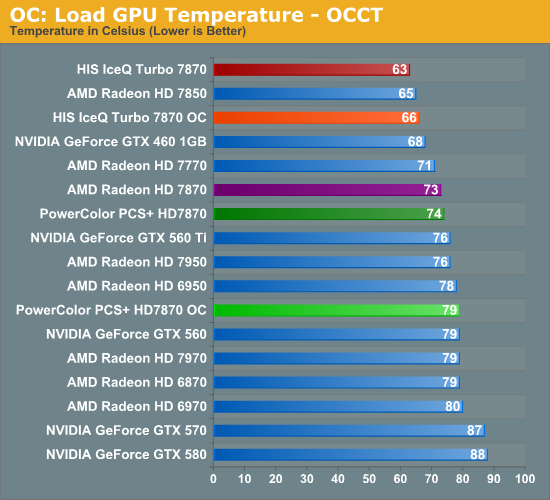
With the increase in power consumption comes the requisite increase in temperatures. At 79C under OCCT the PCS+ HD7870 is still well within our comfort zone, and this is the pathological case. Under Metro the increase is but a fraction, with temperatures going up by only a single degree.
Meanwhile the IceQ Turbo 7870 continues to flaunt its unusual cooler here. Under Metro it reaches a still relatively chilly 62C, and even OCCT can only get the card up to 66C, which is practically unheard of for a 190W card. Once HIS gets voltage controls working, voltage tweakers may very well end up having a field day here as there’s a good 15C+ of thermal headroom to play with on the GPU. Assuming of course that the VRM circuitry on the AMD reference PCB can hold up to further abuse.
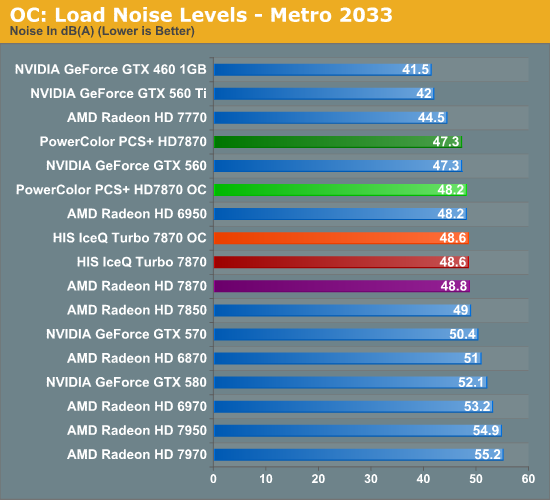
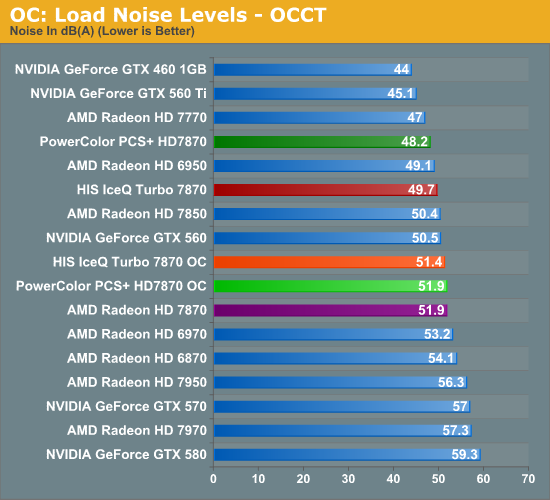
Finally, when it comes to noise the fact that temperatures don’t significantly rise under Metro means that there’s a minimal shift in load noise here. Our double overclocked cards are still quieter than the reference 7870, which in the case of the IceQ Turbo is thanks in large part to its low temperatures requiring no further work from the fan. Meanwhile the PCS+ gives up most of its noise advantage here. OCCT on the other hand finally sees every card jump up above 50dB, with both cards tying or beating the reference 7870 by a fraction of a decibel.
Ultimately the second overclock does have an impact on power consumption, but particularly when paying attention to gameplay as opposed to the pathological OCCT, the cost is very cheap. Unless you’re on a specific power budget or need to stay below the equivalent of 50dB on our charts, there’s still a fair bit of headroom to play with on these retail 7870s.










53 Comments
View All Comments
Zebo - Monday, March 19, 2012 - link
I wish they were mistaken on the price.LuxZg - Monday, March 19, 2012 - link
They were actually... not that it helps much ;->Jephph - Monday, March 19, 2012 - link
Don't worry, they fixed it."Numerous times before we’ve seen loud & cool cards, but it’s rare to come across a quiet and quiet card.
Now, it's not loud and quiet, It's just quiet and quiet.
doylecc - Monday, March 19, 2012 - link
"but it’s rare to come across a quiet and quiet card."Perhaps we should try "cool and quiet", yes?
"In spite of the large blower on the card and the temperatures we’ve seen, the IceQ Turbo well for itself,"
Perhaps "...the IceQ Turbo does well for itself."
Thanks for a very interesting article. I would also like to see an AMD OC v. Nvidia OC article.
nitrousoxide - Monday, March 19, 2012 - link
"A loud and quiet card" --> "a quiet and quiet card"Gosh I just can't help laughing...
LuxZg - Monday, March 19, 2012 - link
"OCCT on the other hand finally sees every card jump up above 50C, with both cards tying or beating the reference 7870 by a fraction of a degree."Aren't you talking about noise here? And not temperature? Tsk tsk ;)
Death666Angel - Monday, March 19, 2012 - link
Especially in the OC section! I don't know how many people are looking at 7970 and 7870 cards, but I for one do like to know how much extra performance that money gives me, especially compared to 7870 OC'ed.As for the cards, they are good enough, but I hate seeing these anaemic factory memory overclocks or no overclocks at all.
Two more things: Is there a chance you will add your OC results to bench in the future? And can you explain why the 7950 beats the 7970 in min. frames Crysis? Doesn't make sense to me. :-)
Ryan Smith - Monday, March 19, 2012 - link
The 7950 only beats the 7970 in Crysis when you use the launch numbers for the 7970. It's been taken care of.Creig - Monday, March 19, 2012 - link
"Idle noise levels are consistent. Both cards are ever so marginally quitter than the reference 7870 at idle."Nobody likes a video card that's a quitter. But I'm sure they'd love one that's quieter.
Roland00Address - Monday, March 19, 2012 - link
I am curious how crossfire 7800 series cards compare to the 7900 series cards